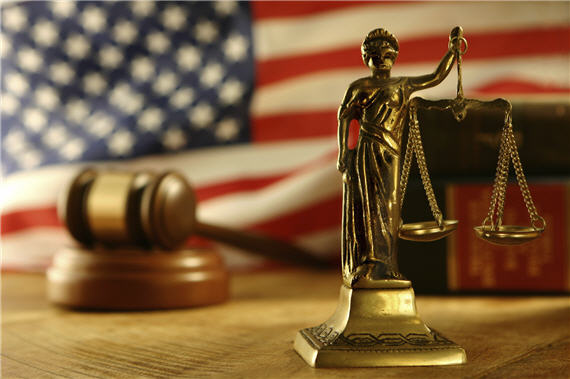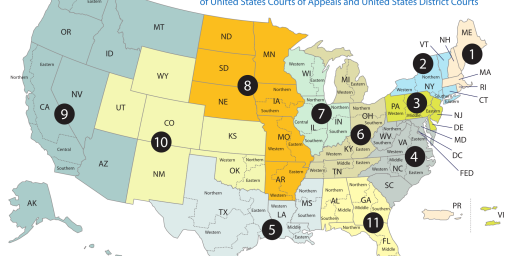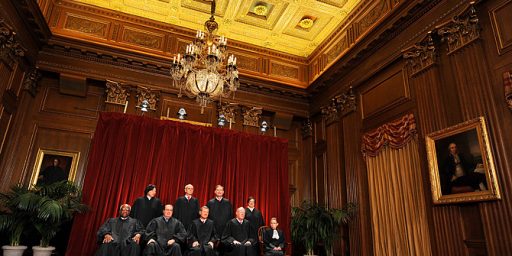Party Over Country: Judiciary Edition
Perversely, highly qualified nominees for the courts are more likely to be rejected by Congress.
Orin Kerr sets up a post on a particular judicial nominee thusly:
The rule of thumb in judicial nominations is that a circuit court nominee with Supreme-Court-level credentials will have a harder time getting confirmed than a nominee without those credentials. Each side tries to limit the Supreme Court “farm team” of the other side. So if a nominee’s resume includes the kind of elite credentials that Supreme Court nominees often have, the scrutiny goes up.
Rather clearly, this is not in the best interests of the country and it’s only marginally in the interests of the parties to behave this way.
Presumably, to the extent that “elite credentials” are useful for service on the Supreme Court, they’re even more useful on the circuit courts. After all, SCOTUS hears a very small number of cases a year, comparatively. True, the Supremes break ties among the circuits and thus have final say in setting precedent. But it seems that we’d want the best legal minds possible at the level that serves as court of last resort for all but a handful of cases.
Relatedly, to the extent that the circuits serve as a “farm system” for SCOTUS, it would seem to be in the best interests of all concerned to have the largest possible number of qualified, seasoned “athletes” available for call up to the Show.
Finally, it’s not at all clear what’s gained in actively sabotaging the other party’s attempts at putting their brightest legal minds on the bench. After all, if a president of the other party is in power when they’re a vacancy for the Supreme Court, they’re going to put someone into that vacancy. That person is almost certainly going to rule in a way that displeases the opposition party in most instances. Isn’t it better that that someone is a highly respected jurist able to help craft logical precedents and see beyond the narrow details of the case in hand?
Put another way, what is the value to liberals in having a Clarence Thomas over an Antonin Scalia? Or to conservatives in having a Sonia Sotomayor over an Elena Kagan?







Americans don’t really care about their judicial system.
Could it just be that the “stars” have tend to have bigger, brighter paper trails with a more clearly elucidated worldview, and that the “non-stars” tend to be blander and less well-known and therefore less scary to the opposition. For example, I could see where it’s much easier for conservatives to imagine a Lawrence Lessig on the Supreme Court and say “no way” to a circuit court appointment, or for a Dem to see the same in some University of Chicago star in the Richard Posner mold, than some relatively anonymous appointee.
Supreme Court is not just a matter of academic qualifications. That also includes things like temper.
If their single goal is the defeat of the President, and if they have already demonstrated their willingness to send the country into default and economic ruin as collateral damage in pursuit of that goal, why then would they hesitate to destroy the judiciary?
There really isn’t any other calculus for Republicans other than “will this help or hurt Obama?”
This post would have a tiny modicum of merit, if limiting the other side’s SCOTUS farm team was the primary reason for preventing ideologues from being seated on the Circuit Courts of Appeals. It isn’t. That’s a major concern but it’s not the primary concern. The primary concern is the fact the SCOTUS hears so few cases. The Courts of Appeals are very important, especially the D.C. Circuit. It’s bad enough to have the prospect of a Sotomayor on the SCOTUS. What’s worse is to get a Kagan on the SCOTUS and then to have a whole bunch of Sotomayors on the various Circuit Courts of Appeals. Ultimately that would be the death of the federal court system.
Also, FYI, in various respects the hardball tactics that began with Teddy Kennedy and Robert Bork actually serve to moderate the federal courts, at least at the lower levels. Obama can’t get the likes of Goodwin Liu onto a federal appeals court. That’s a good thing, Chief. By the same token the next Republican president (whomever that might be) won’t be able to get hard core conservatives onto any federal court, save perhaps for the SCOTUS in the event the next GOP Prez were to nominate someone there who for political reasons the Democrats could not block. In the end, over the long haul, it should all even out. There will be fewer Kagans and fewer Scalias. More Kennedys. Perhaps that’s a better result.
@Tsar Nicholas:
You are correct that this mostly began with the Bork hearings, and Thomas after that. But the extent to which appointments to the Circuit Courts of Appeal have been held up under this President, and the previous one, is something new, and it’s becoming a problem. At this point, there are only a few Circuit Courts that aren’t understaffed with Judges, meaning that they have to rely on Senior (retired) Judges to sit on cases more than they have ever had to. It slows down the resolution of cases, overworks the court staff, and frustrates the parties involved in the cases.